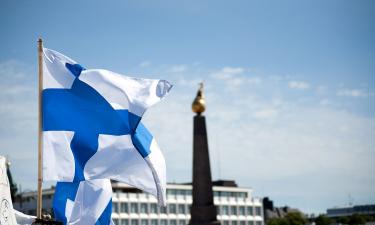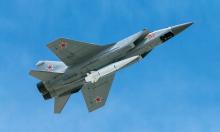C o m m e n t a r y Russia to litigate against Switzerland's Noga in court
On Monday September 15, in the Paris suburb of Baubigny, three Russian citizens will be tried, charged by the notorious Swiss-based firm Noga "with criminal concealment of impounded property".
Facing the trial will be Valery Voskoboinikov, Rosaviakosmos deputy director-general, Alexander Klementyev, deputy director-general of the Russian state unitary enterprise AVPK Sukhoi, and Gennady Arkhipov, deputy director-general of the Russian state unitary enterprise RSK MiG.
The events that led up to the trial are fairly well known. They began on June 22, 2001 at the 44th international airshow at Le Bourget, where the Switzerland-based firm Noga made an attempt to impound a Russian multi-role combat aircraft Su-30MKK and a combat training plane MiG-AT.
The company undertook these actions under the pretext of fulfilling a ruling of the Arbitration Institute of the Stockholm Chamber of Commerce, which allowed it on its own behalf and at its own cost to take any action with a view to obtaining a debt from the Russian government.
As a result, the two warplanes, without waiting for a closing ceremony of the show, as well as a Tu-214 passenger liner and an Il-76 escort transport plane which were also on display at the Le Bourget exhibition, were promptly sent home. The Swiss accused Voskoboinikov, Arkhipov and Klementyev of these actions. And filed a claim with the executive court of the town of Baubigny to find them "guilty of criminal concealment of property impounded in accordance with the provisions of Articles 29 (paragraph 2) of the 91-650 law of June 9, 1991 and 314-b of the Criminal Code of France." Doctor of Law Igor Zenkin, member of the Moscow Regional Bar, who will be defending the three Russian citizens at the French court, in an interview with this RIA Novosti analyst, described Noga's claims to his clients as "far-fetched and invalid".
To begin with, the "impounded" aircraft did not belong to his clients either directly or indirectly. Mr Voskoboinikov, Mr Arkhipov and Mr Klementyev were not owners of this war materiel. The Su-30MKK, built at the Komsomolsk-on-Amur air production association, had on the eve of the show been transferred from the balance-sheet of the enterprise to that of AOOT (public company) OKV Sukhoi and became the property of the company.
Alexander Klementyev holds one of the leading posts in this company, but is in no way the direct owner of the warplane. He was not even appointed the man responsible for the fighter's safety, nor had been issued any relevant instructions or legal powers of attorney. About the same post is held by Arkhipov.
The combat training plane MiG-AT is the property of RSK MiG, but this is a product of international cooperation, including French firms Snecma and Thales Avionics. Arkhipov can in no way dispose of this machine and be responsible for it. Just as AVPK Sukhoi and RSK MiG cannot be responsible for the Russian government's actions.
Secondly, Zenkin said, Arkhipov, Klementyev and Voskoboinikov, although holding sufficiently high posts in their firms, cannot be considered representatives of the Russian government either. They were not mandated by anyone and, moreover, they were not even members of an official delegation of the Russian government to the air show at Le Bourget.
And thirdly, impounding of the two aircraft as a legal deed was not effected on June 22, 2001 at Le Bourget, claims the lawyer. A law enforcement officer drew up two documents which on closer inspection may be only recognised as protocols on the impossibility of effecting an impounding and not an impoundment protocol. In conformity with French laws it is prohibited to impound war materiel, and the Su-30MKK and the MiG-AT are no doubt warplanes, unless there is a special court ruling. No such ruling was made concerning the Russian warplanes.
There are also other legislative inconsistencies.
Zenkin is absolutely certain of the legal validity of his clients' position, just as that the Baubigny court, in handing down a verdict in their favour, would be guided not only by French legislation but also by common sense, which leaves Noga not a single chance to succeed.
The lawyer finds it humorous that Voskoboinikov, Arkhipov and Klementyev should be made to appear before a court as defendants in a case which in no way concerns them. It was simply that representatives of the Swiss company, as Zenkin said, took possession of the defendants' visiting cards and Noga decided to exploit the fact that they hold sufficiently high posts, and take advantage of that, but miscalculated.
Government sources told this analyst that Russia does not refuse to pay Noga its debt which today together with interest amounts to 70 million dollars. But this debt must be settled, as other debts of the Russian Federation to more than a thousand other overseas companies to a total sum of two billion dollars, as part of Moscow's obligations to the London Club. These obligations do not allow the government to show preference for some creditors compared with others.
But such an approach does not suit Noga's owner Nessim Gaon. And he is trying to blackmail the Russian government by impounding sailing ships, warplanes and other equipment of Russia and by filing claims against high-ranking executives of various state and non-state organisations, striving by some way or other to get his debt paid in advance.
To succumb to such blackmail, it is believed in Russia, would mean creating a precedent, which would then come down on the country like a tidal wave. And that is inadmissible. The way which remains is to uphold one's justice in court. Costs will have to be paid by the defeated party.
Subscribe to Pravda.Ru Telegram channel, Facebook, RSS!





